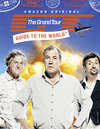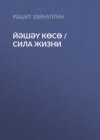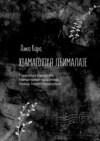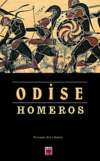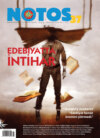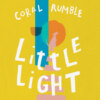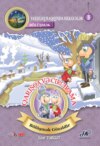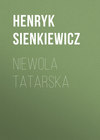Kitabı oku: «Pan Michael», sayfa 21
Here Azya's eyes blazed with a red light; his white teeth glittered like those of old Tugai; he raised his hand and shook his threatening fist toward the north, and he was great and terrible and splendid, so that Halim bowed to him repeatedly, and said hurriedly, in a low voice, —
"Allah kerim! Allah kerim!"21
Then silence continued for a long time. Azya grew calm by degrees; at last he said, "Bogush came here. I revealed to him my strength and resource; namely, to have in the Ukraine, at the side of the Cossack nation, a Tartar nation, and besides the Cossack hetman a Tartar hetman."
"Did he approve it?"
"He seized himself by the head, and almost beat with the forehead; next day he galloped off to the hetman with the happy news."
"Effendi," said Halim, timidly, "but if the Great Lion should not approve it?"
"Sobieski?"
"Yes."
A ruddy light began to gleam again in Azya's eyes; but it remained only during one twinkle. His face grew calm immediately; then he sat on a bench, and resting his head on his hands, fell into deep thought.
"I have weighed in my mind," said he, at last, "what the grand hetman may answer when Bogush gives him the happy news. The hetman is wise, and will consent. The hetman knows that in spring there will be war with the Sultan, for which there are neither men nor money in the Commonwealth; and when Doroshenko and the Cossacks are on the side of the Sultan, final destruction may come on Lehistan, – and all the more that neither the king nor the estates believe that there will be war, and are not hurrying to prepare for it. I have an attentive ear here on everything; I know all, and Bogush makes no secret before me of what they say at the hetman's headquarters. Pan Sobieski is a great man; he will consent, for he knows that if the Tartars come here for freedom and land, a civil war may spring up in the Crimea and the steppes of the Dobrudja, that the strength of the horde will decrease, and that the Sultan himself must see to quieting those outbreaks. Meanwhile, the hetman will have time to prepare himself better; the Cossacks and Doroshenko will waver in loyalty to the Sultan. This is the only salvation for the Commonwealth, which is so weak that even the return of a few thousand Lithuanian Tartars means much for it. The hetman knows this; he is wise, he will consent."
"I bow before your reason," answered Halim; "but what will happen if Allah takes from the Great Lion his light, or if Satan so blinds him with pride that he will reject your plans?"
Azya pushed his wild face up to Halim's ear, and whispered, "You remain here now until the answer comes from the hetman; and till then I will not go to Rashkoff. If they reject my plans, I will send you to Krychinski and the others. You will give them the order to advance to this side of the river almost up to Hreptyoff, and to be in readiness; and I with my men here will fall on the command the first night I choose, and do this for them – " Here Azya drew his finger across his neck, and after a while added, "Fate, fate, fate!"
Halim thrust his head down between his shoulders, and on his beast-like face an ominous smile appeared. "Allah! And that to the Little Falcon?"
"That to him first."
"And then to the Sultan's dominions?"
"To the Sultan's dominions, – with her."
CHAPTER XXXII
A fierce winter covered the forests with heavy snow-clusters and icicles, and filled ravines to their edges with drifts, so that the whole land seemed a single white plain. Great, sudden storms came, in which men and herds were lost under the pall of snow; roads grew misleading and perilous: still, Pan Bogush hastened with all his power to Yavorov to communicate Azya's great plans to the hetman as quickly as possible. A noble of the border, reared in continual danger of Cossacks and Tartars, penetrated with the thought of perils which threatened the country from insurrections, from raids, from the whole power of the Turks, he saw in those plans almost the salvation of the country; he believed sacredly that the hetman, held in homage by him, and by all men of the frontier, would not hesitate a moment when it was a question of the power of the Commonwealth: hence he rode forward with joy in his heart, in spite of snow-drifts, wrong roads, and tempests.
He dropped in at last on a Sunday, together with snow, at Yavorov, and having the good fortune to find Pan Sobieski at home, announced himself straightway, though attendants informed him that the hetman, busied night and day with expeditions and the writing of despatches, had barely time to take food. But beyond expectation, the hetman gave command to call him at once. Therefore, after he had waited only a short time, the old soldier bowed to the knees of his leader.
He found Pan Sobieski changed greatly, and with a face full of care; for those were well-nigh the most grievous years of his life. His name had not thundered yet through every corner of Christendom; but the fame of a great leader and a terrible crusher of the Mussulman encircled him already in the Commonwealth. Owing to that fame, the grand baton was confided to him in time, and the defence of the eastern boundary; but with the dignity of hetman they had given him neither money nor men. Still, victory had followed his steps hitherto as faithfully as his shadow follows a man. With a handful of troops he had won victory at Podhaytse; with a handful of troops he had passed like a flame through the length and the breadth of the Ukraine, rubbing into dust chambuls of many thousands, capturing insurgent cities, spreading dread and terror of the Polish name. But now there hung over the Commonwealth a war with the most terrible of the powers of that period, for it was a war with the whole Mussulman world. It was no longer a secret for Sobieski that since Doroshenko had given up the Ukraine and the Cossacks to the Sultan, the latter had promised to move Turkey, Asia Minor, Arabia, and Egypt as far as the interior of Africa, to proclaim a sacred war, and go in his own person to demand the new "pashalik"22 from the Commonwealth. Destruction, like a bird of prey, was floating over all Southern Russia, and meanwhile there was disorder in the Commonwealth; the nobles were uproarious in defence of their incompetent king, and, assembled in armed camps, were ready for civil war, if for any. The country, exhausted by recent conflicts and military confederations, had become impoverished; envy was storming in it; mutual distrust was rankling in men's hearts.
No one wished to believe that war with the Mussulman power was imminent; and they condemned the great leader for spreading news about it purposely to turn men's minds from home questions. He was condemned greatly for this also, – that he was ready himself to call in the Turks, if only to secure victory to his adherents. They made him simply a traitor; and had it not been for the army, they would not have hesitated to impeach him.
In view of the approaching war, to which thousands of legions of wild people would march from the East, he was without an army, – he had merely a handful, so small that the Sultan's court counted more servants; he was without money, without means of repairing the ruined fortresses, without hope of victory, without possibility of defence, without the conviction that his death, as formerly the death of Jolkyevski, would rouse the torpid country and give birth to an avenger. That was the reason that care had settled on his forehead; and the lordly countenance, like that of a Roman conqueror with a forehead in laurels, bore traces of hidden pain and sleepless nights. But at sight of Bogush a kindly smile brightened the face of the hetman; he placed his hands on the shoulders of the man inclining before him, and said, —
"I greet you, soldier, I greet you! I had not hoped to see you so soon; but you are the dearer to me in Yavorov. Whence do you come, – from Kamenyets?"
"No, serene, great, mighty lord hetman, I have not even been at Kamenyets. I come straightway from Hreptyoff."
"What is my little soldier doing there? Is he well, and has he cleared the wilds of Ushytsa even somewhat?"
"The wilds are so peaceful that a child might pass through them in safety. The robbers are hanged, and in these last days Azba Bey with his whole party was cut to pieces, so that even a witness of the slaughter was not left. I arrived there on the very day of their destruction."
"I recognize Volodyovski: Rushchyts in Rashkoff is the only man who may compare with him. But what do they say in the steppes? Are there fresh tidings from the Danube?"
"There are, but of evil. There is to be a great muster of troops at Adrianople in the last days of winter."
"I know that already. There are no tidings now save of evil, – evil from the Commonwealth, evil from the Crimea and from Stambul."
"But not altogether, for I myself bring such good tidings that if I were a Turk or a Tartar I should surely mention a present."
"Well, then, you have fallen from heaven to me. Come, speak quickly, dispel my anxiety!"
"But if I am so frozen, your great mightiness, that the wit has stiffened in my head?"
The hetman clapped his hands, and commanded an attendant to bring mead. After a while they brought in a mouldy decanter, and candlesticks with burning tapers, for though the hour was still early, snowy clouds had made the air so gloomy that outside, as well as in the house, it was like nightfall.
The hetman poured out and drank to his guest; the latter, bowing low, emptied his glass, and said: "The first news is this, that Azya, who was to bring back to our service the captains of the Lithuanian Tartars and the Cheremis, is not called Mellehovich, he is a son of Tugai Bey."
"Of Tugai Bey?" asked Pan Sobieski, with amazement.
"Thus it is, your great mightiness. It has come out that Pan Nyenashinyets carried him away from the Crimea while a child, but lost him on the road home; and Azya, falling into possession of the Novoveskis, was reared at their house without knowing that he was descended from such a father."
"It was a wonder to me that he, though so young, was held in such esteem among the Tartars. But now I understand; and the Cossacks too, even those who have remained faithful to the mother,23 consider Hmelnitski as a kind of saint, and are proud of him."
"That is just it, just it; I told Azya the same thing," said Pan Bogush.
"Wonderful are the ways of God," said the hetman, after a while; "old Tugai shed rivers of blood in our country, and his son is serving it, – at least he serves it faithfully so far; but now I do not know whether he will not wish to taste Crimean greatness."
"Now? Now he is still more faithful; and here my second tidings begin, in which it may be that strength and resource and salvation for the suffering Commonwealth are contained. So help me God, I forgot fatigue and danger in view of these tidings, so as to let them out of my lips at the earliest moment, and console your troubled heart."
"I am listening eagerly," said Pan Sobieski.
Bogush began to explain Azya's plans, and presented them with such enthusiasm that he grew really eloquent. From time to time his hand, trembling from emotion, poured out a glass of mead, spilling the noble drink over the rim; and he spoke and spoke on. Before the astonished eyes of the grand hetman passed as it were clear pictures of the future; therefore thousands and tens of thousands of Tartars came for land and freedom, bringing their wives and children and their herds; therefore the astonished Cossacks, seeing the new power of the Commonwealth, bowed down to it obediently, bowed down to the king and the hetman; hence there was rebellion in the Ukraine no longer; hence raids, destructive as fire or flood, were advancing no longer on the old roads against Russia, – but at the side of the Polish and the Cossack armies moved over the measureless steppes, with the playing of trumpets and the rattle of drums, chambuls of Tartars, nobles of the Ukraine.
And for whole years carts after carts were advancing, and in them, in spite of the commands of Khan and Sultan, were multitudes who preferred the black land of the Ukraine and bread to their former hungry settlements. And the power, hostile aforetime, was moving to the service of the Commonwealth. The Crimea became depopulated; their former power slipped out of the hands of the Khan and the Sultan, and dread seized them; for from the steppes, from the Ukraine, the new hetman of a new Tartar nobility looked threateningly into their eyes, – a guardian and faithful defender of the Commonwealth, the renowned son of a terrible father, young Tugai Bey.
A flush came out on the countenance of Bogush; it seemed that his own words bore him away, for at the end he raised both hands and cried, —
"This is what I bring! This is what that dragon's whelp has brooded out in the wild woods of Hreptyoff! All that is needed now is to give him a letter and permission from your great mightiness to spread a report in the Crimea and on the Danube. Your great mightiness, if Tugai Bey's son were to do nothing except to make an uproar in the Crimea and on the Danube, to cause misunderstandings, to rouse the hydra of civil war among the Tartars, to embroil some camps against others, and that on the eve of conflict, I repeat, he would render a great and undying service to the Commonwealth."
But Pan Sobieski walked back and forth with long strides through the room, without speaking. His lordly face was gloomy, almost terrible; he strode, and it was to be seen that he was conversing in his soul, – unknown whether with himself or with God.
At last thou didst open some page in thy soul, grand hetman, for thou gavest answer in these words to the speaker: —
"Bogush, even if I had the right to give such a letter and such permission, while I live I should not give them."
These words fell as heavily as if they had been of molten lead or iron, and weighed so on Bogush that for a time he was dumb, hung his head, and only after a long interval did he groan out, —
"Why, your great mightiness, why?"
"First, I will tell you, as a statesman, that the name of Tugai Bey's son might attract, it is true, a certain number of Tartars, if land, liberty, and the rights of nobility were offered them; but not so many would come as he and you have imagined. And, besides, it would be an act of madness to call Tartars to the Ukraine, and settle new people there, when we cannot manage the Cossacks alone. You say that disputes and war will rise among them at once, that there will be a sword ready for the Cossack neck; but who will assure you that that sword would not be stained with Polish blood also? I have not known this Azya, hitherto; but now I perceive that the dragon of pride and ambition inhabits his breast, therefore I ask again, who will guarantee that there is not in him a second Hmelnitski? He will beat the Cossacks; but if the Commonwealth shall fail to satisfy him in something, and threaten him with justice and punishment for some act of violence, he will join the Cossacks, summon new hordes from the East, as Hmelnitski summoned Tugai Bey, give himself to the Sultan, as Doroshenko has done, and, instead of a new growth of power, new bloodshed and defeats will come on us."
"Your great mightiness, the Tartars, when they have become nobles, will hold faithfully to the Commonwealth."
"Were there few of the Lithuanian Tartars and Cheremis? They were nobles a long time, and went over to the Sultan."
"Their privileges were withheld from the Lithuanian Tartars."
"But what will happen if, to begin with, the Polish nobles, as is certain, oppose such an extension of their rights to others? With what face, with what conscience, will you give to wild and predatory hordes, who have been destroying our country continually, the power and the right to determine the fate of that country, to choose kings, and send deputies to the diets? Why give them such a reward? What madness has come to the head of this Tartar, and what evil spirit seized you, my old soldier, to let yourself be so beguiled and seduced as to believe in such dishonor and such an impossibility?"
Bogush dropped his eyes, and said with an uncertain voice: —
"I knew beforehand that the estates would oppose; but Azya said that if the Tartars were to settle with permission of your great mightiness, they would not let themselves be driven out."
"Man! Why, he threatened, he shook his sword over the Commonwealth, and you did not see it!"
"Your great mightiness," said Bogush, in despair, "it might be arranged not to make all the Tartars nobles, only the most considerable, and proclaim the rest free men. Even in that situation they would answer the summons of Tugai Bey's son."
"But why is it not better to proclaim all the Cossacks free men? Cease, old soldier! I tell you that an evil spirit has taken possession of you."
"Your great mightiness – "
"And I say farther," here Pan Sobieski wrinkled his lionlike forehead and his eyes gleamed, "even if everything were to happen as you say, even if our power were to increase through this action, even if war with Turkey were to be averted, even if the nobles themselves were to call for it, still, while this hand of mine wields a sabre and can make the sign of the cross, never and never will I permit such a thing! So help me God!"
"Why, your great mightiness?" repeated Bogush, wringing his hands.
"Because I am not only a Polish hetman, but a Christian hetman, for I stand in defence of the Cross. And even if those Cossacks were to tear the entrails of the Commonwealth more cruelly than ever, I will not cut the necks of a blinded but still Christian people with the swords of Pagans. For by doing so I should say 'raca' to our fathers and grandfathers, to my own ancestors, to their ashes, to the blood and tears of the whole past Commonwealth. As God is true! if destruction is waiting for us, if our name is to be the name of a dead and not of a living people, let our glory remain behind and a memory of that service which God pointed out to us; let people who come in after time say, when looking at those crosses and tombs: 'Here is Christianity; here they defended the Cross against Mohammedan foulness, while there was breath in their breasts, while the blood was in their veins; and they died for other nations.' This is our service, Bogush. Behold, we are the fortress on which Christ fixed His crucifix, and you tell me, a soldier of God, nay, the commander of the fortress, to be the first to open the gate and let in Pagans, like wolves to a sheep-fold, and give the sheep, the flock of Jesus, to slaughter. Better for us to suffer from chambuls; better for us to endure rebellions; better for us to go to this terrible war; better for me and you to fall, and for the whole Commonwealth to perish, – than to put disgrace on our name, to lose our fame, and betray that guardianship and that service of God."
When he had said this, Pan Sobieski stood erect in all his grandeur; on his face there was a radiance such as must have been on that of Godfrey de Bouillon when he burst in over the walls of Jerusalem, shouting, "God wills it!" Pan Bogush seemed to himself dust before those words, and Azya seemed to him dust before Pan Sobieski, and the fiery plans of the young Tartar grew black and became suddenly in the eyes of Bogush something dishonest and altogether infamous. For what could he say after the statement of the hetman that it was better to fall than to betray the service of God? What argument could he bring? Therefore he did not know, poor knight, whether to fall at the knees of the hetman, or to beat his own breast, repeating, "Mea culpa, mea maxima culpa."
But at that moment the sound of bells was given out from the neighboring Dominican monastery.
Hearing this, Pan Sobieski said, —
"They are sounding for vespers, Bogush; let us go and commit ourselves to God."
CHAPTER XXXIII
As much as Pan Bogush hastened when going from Hreptyoff to the hetman, so much did he loiter on the way back. He halted a week or two in each more considerable place; he spent Christmas in Lvoff, and the New Year came on him there. He carried, it is true, the hetman's instructions for the son of Tugai Bey; but they contained merely injunctions to finish the affair of the captains promptly, and a dry and even threatening command to leave his great plans. Pan Bogush had no reason to push on, for Azya could do nothing among the Tartars without a document from the hetman. He loitered, therefore, visiting churches along the road, and doing penance because he had joined Azya's plans.
Meanwhile guests had swarmed into Hreptyoff immediately after the New Year. From Kamenyets came Naviragh, a delegate from the patriarch of Echmiadzin, with him the two Anardrats, skilful theologians from Kaffa, and a numerous retinue. The soldiers wondered greatly at the strange garments of these men, at the violet and red Crimean caps, long shawls, velvet and silk, at their dark faces, and the great gravity with which they strode, like bustards or cranes, through the Hreptyoff stanitsa. Pan Zaharyash Pyotrovich, famed for his continual journeys to the Crimea, nay, to Tsargrad itself, and still more for the eagerness with which he sought out and ransomed captives in the markets of the East, accompanied, as interpreter, Naviragh and the Anardrats. Pan Volodyovski counted out to him at once the sum needful to ransom Pan Boski; and since the wife had not money sufficient, he gave from his own; Basia added her ear-rings with pearls, so as to aid more efficiently the suffering lady and her charming daughter. Pan Seferovich, pretor of Kamenyets, came also, – a rich Armenian whose brother was groaning in Tartar bonds, – and two women, still young and of beauty far from inconsiderable, though somewhat dark, Pani Neresevich and Pani Kyeremovich. Both were concerned for their captive husbands.
The guests were for the greater part in trouble, but there were joyous ones also. Father Kaminski had sent, to remain for the carnival at Hreptyoff, under Basia's protection, his niece Panna Kaminski; and on a certain day Pan Novoveski the younger – that is, Pan Adam – burst in like a thunderbolt. When he had heard of the arrival of his father at Hreptyoff he obtained leave at once from Pan Rushchyts, and hastened to meet him.
Pan Adam had changed greatly during the last few years; first of all, his upper lip was shaded thickly by a short mustache, which did not cover his teeth, white as a wolf's teeth, but was handsome and twisted. Secondly, the young man, always stalwart, had now become almost a giant. It seemed that such a dense and bushy forelock could grow only on such an enormous head, and such an enormous head could find needful support only on fabulous shoulders. His face, always dark, was swarthy from the winds; his eyes were gleaming like coals; defiance was as if written on his features. When he seized a large apple he hid it so easily in his powerful palm that he could play "guess which one;" and when he put a handful of nuts on his knee and pressed them with his hand he made snuff of them. Everything in him went to strength; still he was lean, – his stomach was receding, but the chest above it was as roomy as a chapel. He broke horseshoes with ease, he tied iron rods around the necks of soldiers, he seemed even larger than he was in reality; when he walked, planks creaked under him; and when he stumbled against a bench, he knocked splinters from it.
In a word, he was a man in a hundred, in whom life, daring, and strength were boiling, as water in a caldron. Not being able to find room, in even such an enormous body, it seemed that he had a flame in his breast and his head, and involuntarily one looked to see if his forelock were not steaming. In fact, it steamed sometimes, for he was good at the goblet. To battle he went with a laugh which recalled the neighing of a charger; and he hewed in such fashion that when each engagement was over soldiers went to examine the bodies left by him, and wonder at his astonishing blows. Accustomed, moreover, from childhood to the steppe, to watchfulness and war, he was careful and foreseeing in spite of all his vehemence; he knew every Tartar stratagem, and, after Volodyovski and Rushchyts, was deemed the best partisan leader.
In spite of threats and promises, old Novoveski did not receive his son very harshly; for he feared lest he might go away again if offended, and not show himself for another eleven years. Besides, the selfish noble was satisfied at heart with that son who had taken no money from home, who had helped himself thoroughly in the world, won glory among his comrades, the favor of the hetman, and the rank of an officer, which no one else could have struggled to without protection. The father considered that this young man, grown wild in the steppes, might not bend before the importance of his father, and in such a case it was not best to expose it to the test. Therefore the son fell at his feet, as was proper; still he looked into his eyes, and at the first reproach he answered without ceremony, —
"Father, you have blame in your mouth, but at heart you are glad, and with reason, I have incurred no disgrace, – I ran away to the squadron; besides, I am a noble."
"But you may be a Mussulman," said the father, "since you did not show yourself at home for eleven years."
"I did not show myself through fear of punishment, which would be repugnant to my rank and dignity of officer. I waited for a letter of pardon; I saw nothing of the letter, you saw nothing of me."
"But are you not afraid at present?"
The young man showed his white teeth with a smile. "This place is governed by military power, to which even the power of a father must yield. Why should you not, my benefactor, embrace me, for you have a hearty desire to do so?"
Saying this, he opened his arms, and Pan Novoveski did not know himself what to do. Indeed, he could not quarrel with that son who went out of the house a lad, and returned now a mature man and an officer surrounded with military renown. And this and that flattered greatly the fatherly pride of Pan Novoveski; he hesitated only out of regard for his personal dignity.
But the son seized him; the bones of the old noble cracked in the bear-like embrace, and this touched him completely.
"What is to be done?" cried he, panting. "He feels, the rascal, that he is sitting on his own horse, and is not afraid. 'Pon my word! if I were at home, indeed I should not be so tender; but here, what can I do? Well, come on again."
And they embraced a second time, after which the young man began to inquire hurriedly for his sister.
"I gave command to keep her aside till I called her," said the father; "the girl will jump almost out of her skin."
"For God's sake, where is she?" cried the son, and opening the door he began to call so loudly that an echo answered, "Eva! Eva!" from the walls.
Eva, who was waiting in the next chamber, rushed in at once; but she was barely able to cry "Adam!" when strong arms seized her and raised her from the floor. The brother had loved her greatly always; in old times, while protecting her from the tyranny of their father, he took her faults on himself frequently, and received the floggings due her. In general the father was a despot at home, really cruel; therefore the maiden greeted now in that strong brother, not a brother merely, but her future refuge and protection. He kissed her on the head, on the eyes and hands; at times he held her at arms' length, looked into her face, and cried out with delight, —
"A splendid girl, as God is dear to me!" Then again, "See how she has grown! A stove,24 not a maiden!"
Her eyes were laughing at him. They began to talk then very rapidly, of their long separation, of home and the wars. Old Pan Novoveski walked around them and muttered. The son made a great impression on him; but at times disquiet touching his own future authority seemed to seize him. Those were the days of great parental power, which grew to boundless preponderance afterward; but this son was that partisan, that soldier from the wild stanitsas, who, as Pan Novoveski understood at once, was riding on his own special horse. Pan Novoveski guarded his parental authority jealously. He was certain, however, that his son would always respect him, would give him his due; but would he yield always like wax, would he endure everything as he had endured when a stripling? "Bah!" thought the old man, "if I make up my mind to it, I'll treat him like a stripling. He is daring, a lieutenant; he imposes on me, as I love God." To finish all, Pan Novoveski felt that his fatherly affection was growing each minute, and that he would have a weakness for that giant of a son.
Meanwhile Eva was twittering like a bird, overwhelming her brother with questions. "When would he come home; and wouldn't he settle down, wouldn't he marry?" She in truth does not know clearly, and is not certain; but as she loves her father, she has heard that soldiers are given to falling in love. But now she remembers that it was Paul Volodyovski who said so. How beautiful and kind she is, that Pani Volodyovski! A more beautiful and better is not to be found in all Poland with a candle. Zosia Boski alone might, perhaps, be compared with her.
"Who is Zosia Boski?" asked Pan Adam.
"She who with her mother is stopping here, whose father was carried off by the Tartars. If you see her yourself you will fall in love with her."
"Give us Zosia Boski!" cried the young officer.
The father and Eva laughed at such readiness.
"Love is like death," said Pan Adam: "it misses no one. I was still smooth-faced, and Pani Volodyovski was a young lady, when I fell terribly in love with her. Oi! dear God! how I loved that Basia! But what of it! 'I will tell her so,' thought I. I told her, and the answer was as if some one had given me a slap in the face. Shu, cat away from the milk! She was in love with Pan Volodyovski, it seems, already; but what is the use in talking? – she was right."

